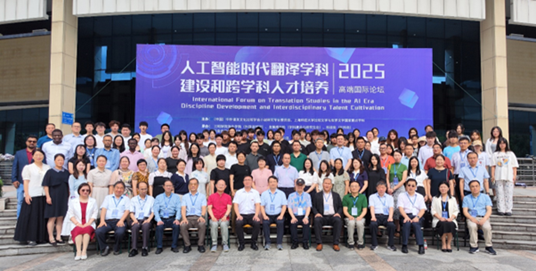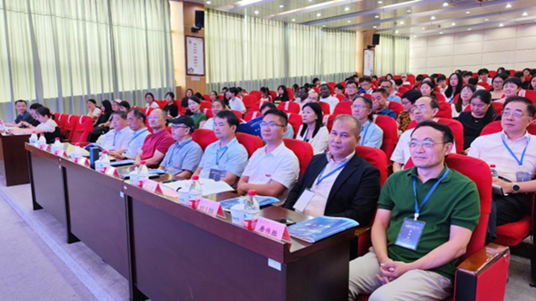
Participants get together at the forum. [Photo provided to chinadaily.com.cn]
A major event — called the International Forum on Translation Studies in the AI Era: Discipline Development and Interdisciplinary Talent Cultivation — was convened on June 20-22.
The forum took place at Sanming University — located in Sanming city, in East China's Fujian province.
It was jointly sponsored by Fiction Studies Commission of the China Association for Comparative Studies of Languages and Cultures and the National Key Discipline of Comparative Literature and World Literature at Shanghai Normal University.
Moreover, the event was jointly hosted by the School of Overseas Education (School of Foreign Languages) of Sanming University and other departments.
Over 100 scholars from 30 universities in six countries attended the forum. During the event, leading scholars from home and abroad conducted in-depth discussions on theoretical innovation, applications practice and technology empowerment of translation disciplines.
The forum focused on three core themes: the oretical innovation, practical applications and technology empowerment in translation studies.
At the opening ceremony, Chen Riqing, vice president of Sanming University and Professor Zhu Zhenwu, chairman of the Fiction Studies Commission of the China Association for Comparative Studies of Languages and Cultures, delivered keynote addresses.
These underscored the transformative potential of artificial intelligence or AI in translations, emphasizing the need for interdisciplinary approaches to cultivate versatile talent that is capable of meeting contemporary global demands.

Proceedings start at the forum at Sanming University. [Photo provided to chinadaily.com.cn]
After the opening, 16 top scholars from China and abroad engaged in robust discussions across the forum's three main sections, forging a consensus on integrating theoretical guidance, practical exploration and technology-driven advancements.
Five sub-forums further enriched the dialogue, addressing critical areas of disciplinary development and offering fresh perspectives on the future of translation studies.
Experts unanimously advocated a needs-driven approach to translation education, emphasizing the synergy of theoretical innovation, practical applications and AI technologies. They highlighted the discipline's pivotal role in advancing national cultural communications and supporting international exchanges, contributing to the vision of a shared global future.
The closing ceremony featured a summary address by Chen Lieping, Party secretary of Sanming University. He described the forum as a feast of ideas and wisdom, likening the vitality of translation studies to a clear stream fed by living water. Reflecting on Sanming's legacy of progressive change, Chen affirmed the university's commitment to embracing AI-driven transformation in translation studies.
In a practical application of academic insights, forum experts provided on-site guidance for the Internationalization of Shaxian Snacks, fostering the integration of scholarly discourse with local cultural promotion.
The landmark event is said to have underscored Sanming University's leadership in advancing translation studies and its dedication to shaping interdisciplinary talent in the AI era.
Lu Min, professor and PhD, is dean of School of Overseas Education (School of Foreign Languages) in Sanming University and professor at Shanghai Normal University.
Mohammad Saiyedul Islam, PhD, is a senior lecturer and researcher at the School of Overseas Education (School of Foreign Languages) in Sanming University.
链接地址:http://fujian.chinadaily.com.cn/2025-06/24/c_1102657.htm China daliy
